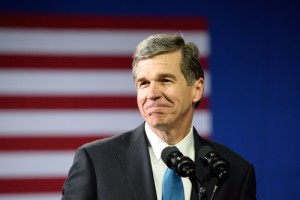North Carolina's incoming governor threatens to sue over legislature's moves to limit his powers

North Carolina Governor-elect Roy Cooper. Evan El-Amin / Shutterstock.com
Updated: North Carolina Gov.-elect Roy Cooper has threatened to sue Republicans controlling the state legislature if they follow through their surprise special session’s series of legislative proposals that would severely limit Cooper’s power when taking office in January, the News & Observer reports.
“Most people might think that this is a partisan power grab,” Cooper told reporters Thursday. “But this is more ominous.”
The legislation would take away most of the governor’s appointment powers by cutting the number of appointed positions to just 300, down from 1,500, ending the governor’s control of election boards; have the state senate handle approval of the governor’s cabinet appointments; and take over his power to appoint trustees to the University of North Carolina system.
“They will see me in court,” Cooper said. “And they don’t have a very good record there.”
(The U.S. Fourth Circuit Court of Appeals ruled in July that North Carolina’s voter ID law is unconstitutional, saying it “target[ed] African-Americans with almost surgical precision” to “impose cures for problems that did not exist.”)
Two major bills were approved by the legislature Friday, the New York Times reported. Departing Gov. Pat McCrory signed a bill Friday that takes from future governors their power to appoint a majority to the State Board of Elections.
University of California, Irvine, law professor Richard Hasen wrote at Election Law Blog that he expects federal voting rights litigation against this law.
The unprecedented legislative moves come on the heels of Republican Gov. Pat McCrory finally conceding victory to Cooper in the November election after challenging the results for nearly a month. Some attribute McCrory’s loss to the state’s H.B. 2 law, which ended protections for gay and transgender persons and also was hastily moved through the legislature and brought widespread disapproval, costing the state money in lost business.
David Lewis, a leader in the state’s Republican House, told reporters that his party would “work to establish that we are going to continue to be a relevant party in governing the state,” the New York Times reports.
A Raleigh lawyer who argued against change in election law adopted by the Republican-controlled legislature in 2013 believes the unprecedented moves this week likely will not hold up well in the courts.
“The state Constitution is a little-read and less understood document,” says Press Millen. “In my view, it contains a lot of landmines for a legislature that seems bent on reconfiguring 250 years worth of North Carolina governance kind of by personal pique.”
Hundreds of protesters entered the legislature’s gallery Thursday and about 20 were arrested, including a credentialed news reporter covering that news, the News & Observer reported in a separate story.
Updated Dec. 19 to note actions by the governor and legislature, blog comments by Hasen.



